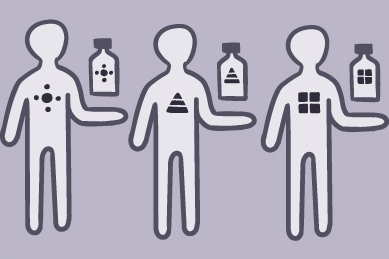Cancer Care Gets Personal
How Tumor Treatments Are Changing

Last year more than 1.7 million people were diagnosed with cancer in the United States. Cancer can be difficult to treat because each tumor is unique. Scientists are now gaining a better understanding of the changes that lead to cancer—and figuring out how to target them for personalized treatments.
“Cancer treatment is changing at a very fast pace,” says Dr. Patricia M. LoRusso, an NIH-funded cancer treatment expert at Yale Cancer Center. “What somebody got a year ago may not necessarily be the same treatment recommended for another person today.”
For decades, doctors have treated cancers based on where a tumor first started, such as in the lung or colon. But often, a treatment that works well for one person doesn’t work as well for another.
Research has revealed that each tumor has a unique combination of Having to do with genes, stretches of DNA you inherit from your parents that define features, like your risk for certain diseases. genetic changes. Cancer is caused by changes in genes that control the ways cells grow and survive. The cells begin to divide without stopping. They form growths called tumors, and some spread to other parts of the body.
The genetic changes that cause cancer are most often from exposure to sunlight, tobacco, and other things in the environment that can damage genes. But some cancer-causing genes can also be passed down from your parents.
These insights have led scientists to look for the unique genetic features of each person’s tumor and then attack those specifically.
“Many times, we’re trying to turn off certain pathways in the tumor that are activated and that cause it to continue to grow,” LoRusso says. This type of treatment is called “targeted therapy” because the drugs target the specific changes in cancer cells that help them to survive and spread.
Doctors can now send a sample of the tumor to a lab to identify important genetic changes. The doctor can then match the unique changes with the treatment that is most likely to help.
“There are several drugs that are now on the market that have made a huge impact in the treatment of several types of cancer,” LoRusso says.
Genetic testing isn’t available yet for many types of cancer. NIH-funded studies are looking for ways to develop targeted therapies for more cancer types.
Another approach researchers are taking is to use a patient’s own disease-fighting cells, called immune cells, to find and kill cancer cells in their body. Scientists have successfully inserted cancer-fighting genes into a patient’s immune cells. Two such therapies were recently approved by FDA. They are the first two gene therapies ever approved by FDA.
Cancer treatment is changing very quickly. Ask your doctor about the newest treatments for your type of cancer.
“It’s your right and responsibility to make sure you’re getting the right treatment, and that may involve wanting to get a second opinion,” LoRusso advises. Most doctors welcome a second opinion.
For tips on how to find a cancer specialist and learn about your treatment options, see the Wise Choices box.
NIH Office of Communications and Public Liaison
Health and Science Publications Branch
Building 31, Room 5B52
Bethesda, MD 20892-2094
Contact Us:
nihnewsinhealth@od.nih.gov
Phone: 301-451-8224
Share Our Materials: Reprint our articles and illustrations in your own publication. Our material is not copyrighted. Please acknowledge NIH News in Health as the source and send us a copy.
For more consumer health news and information, visit health.nih.gov.
For wellness toolkits, visit www.nih.gov/wellnesstoolkits.




